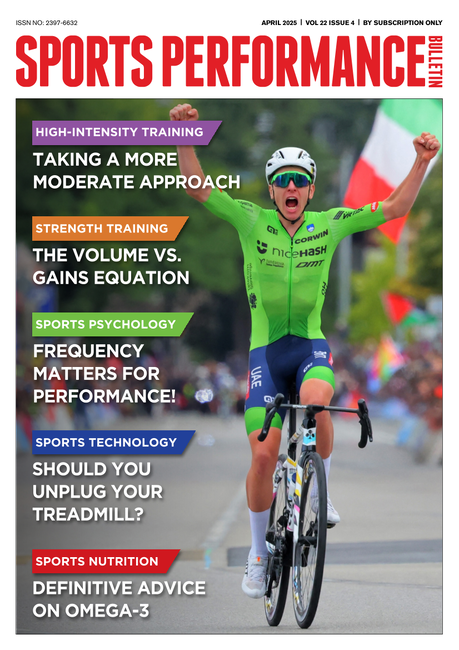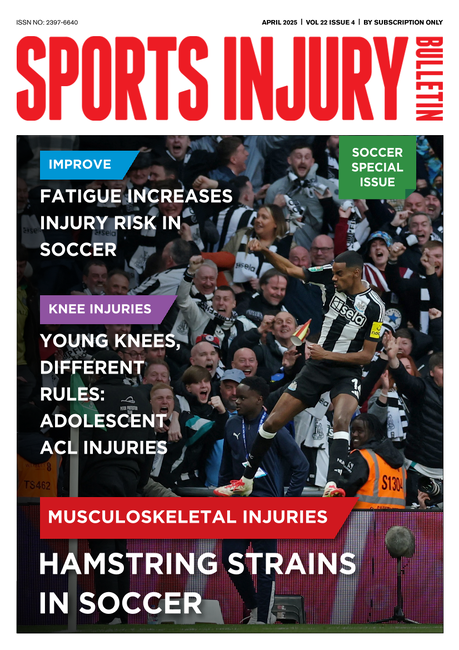Eating behaviours in athletes: are you at risk of an eating disorder?

Optimising eating patterns for maximum performance can increase the risk of eating disorders in vulnerable athletes. Dr Helen Lane and Professor Andy Lane examine how athletes and exercisers can gain confidence to exert healthy self-control around food
Weight management and diet is an important issue for athletes and exercisers alike. Exercisers tend to be interested in diet for health or body image related reasons, while athletes are often motivated to lose weight because they believe it can lead to improved performance or as a necessary part of preparation in weight-classified sports.
While a low body weight can be helpful for health and/or sports performance, caution is urged if success comes from using extreme strategies. Although engaging in sport and exercise and eating a healthy diet is an effective way of controlling weight and raising self-esteem, it is important to avoid developing obsessive thoughts about diet. This article will examine some of the myths about controlling eating behaviours, suggest how unhealthy eating behaviours develop, and propose strategies to gain confidence to exert self-control around food. We use data from a recent case study to explain the intervention we propose(1).
Myths about eating behaviours
The importance of weight loss is highlighted repeatedly by the media, which bombards us with information on diet and exercise, including what to eat, how to lose weight, and how to exercise. Ideally, all individuals should be able to eat healthily without any difficulty and maintain a healthy weight. However, some individuals do need to lose weight and learn strategies to maintain a healthy weight without dieting. Evidence suggests that the majority of those who diet to lose weight fail to keep the weight off over an extended period and have a higher weight gain in the future compared with individuals who do not diet(2). The minority of individuals who succeed in losing large amounts of weight long term by using extreme weight loss techniques can be condemned to a life of weight obsession, yo-yo dieting, chronic hunger and mood swings.
Studies show that some athletes are prone to using extreme strategies to lose weight. Moreover, athletes needing to reach a certain bodyweight often use extreme weight loss methods in a quest to lose a large amount rapidly. For example, in a study investigating weight loss dietary practices such as fasting in boxers(3), one boxer reported that his diet in the days before competition involved only eating raw lemons, advice he was given by a former world professional boxing champion.
Making the weight can clearly be detrimental, leading to dehydration and reduced energy levels, and poor performance. Unfortunately, some athletes may also believe that they will gain mental toughness by making the weight using these methods, and this will improve performance. Sports such as boxing and wrestling can positively reinforce extreme dieting, because two boxers who are both equally starved can compete, which means the winning boxer positively reinforces the use of extreme weight-making strategies such as the ‘lemon-only’ diet. However, as research shows(3), rapid weight loss leads to hampered performance when performance is assessed using methods such as finish time, or the amount of repetitions performed.
“The key to developing healthy eating habits and to be in control of eating behaviour is to identify how any abnormal eating behaviours may have developed, and then learn strategies to enhance confidence and exert self-control around food”
Fortunately, many coaches, fitness instructors and nutritionists recommend careful planning when reducing body fat rather than crash dieting. After giving such advice, it might be reasonable to assume that athletes will develop and maintain healthy eating behaviours. However, this is not always the case. A number of studies show that education programmes and knowledge about nutrition and food risks does not often translate into more healthy eating behaviours(4). Arguably, it is possible that such individuals had already developed some dysfunctional eating attitudes and unhealthy eating behaviours, so providing nutritional information would not have worked anyway. Moreover, evidence suggests that many athletes and exercisers have a good nutritional knowledge of food(5). The key therefore to developing healthy eating habits and to be in control of eating behaviour is to identify how any abnormal eating behaviours may have developed, and then learn strategies to enhance confidence and exert self-control around food.
How do eating behaviours develop?
Diet and patterns of eating behaviour derive from a number of individual and environmental factors. Amid a number of possible factors, cognitive aspects, and particularly thought processes about food and around eating behaviours are especially important.
We should remember that for most of us, what we eat, how much we eat and when we eat are choices we freely make; we are not force-fed. While acknowledging this point, individuals make choices around food along with a number of issues.
The desire to eat is a biological urge and trying to deny this urge can be very difficult, something that is exacerbated when we have conditioned behaviours. For example, the boxer on the lemon-diet believes that this will lead to weight loss and making the weight based on this belief is reinforced when he makes the weight. He will experience positive emotions when he feels he can make the weight and use these emotions to help endure the unpleasant feelings from such a diet to achieve his goal.
Obsessive thoughts and unhealthy eating behaviour such as binging and dieting are often linked to experiencing negative emotions. For example, an individual who reports feeling stressed, frustrated, or depressed, might tend to binge eat on unhealthy foods. Data from a recent study illustrates this point(6). An exerciser named Abbey was asked if emotions affected her eating behaviour. She replied: ‘Yeah, when I’m depressed I eat. I eat lots of really unhealthy foods like biscuits, chocolates and crisps – the sweeter and fattier the better and I keep eating even though I am full – what is that saying? I know by eating it won’t make me happier, but I keep trying all the same’.
Abbey may partly choose to eat sweet foods because the surge of sugar can temporarily boost levels chemical substances in your brain that help you feel happy. However, while these foods may make you feel better for a short time, it can have detrimental effects if you gain weight. Further, it could lead to habitual patterns whereby you repeat episodes of binging whenever you feel depressed. If binge eating leads to weight gain, individuals can then become depressed because of their subsequent weight gain. Binge eating as a response to stress and depression can in turn become the cause of subsequent feelings of stress/depression, and a negative cycle of unpleasant emotions and binge eating emerges.
Dysfunctional eating behaviours may depend on the intensity of negative emotions being experienced, and whether those negative emotions are internalised to a sense of self, rather than a response to external factors. For example, an individual who feels they can’t do a task because she/he feels she/he is a useless person is more likely to adopt disordered eating behaviours such as binging more than an individual with high self-esteem. Many individuals say they cannot consistently maintain healthy eating behaviours because they experience bouts of depressed mood, and use eating as a strategy to make them feel happier(7). However, if asked in an interview about eating behaviour, many of these same individuals will also indicate that they know that binge eating won’t make them feel better (see Abbey’s statement)!
An important key to controlling eating behaviours is to unlock the extent to which the individual is aware of the emotions that accompany food and what has caused these emotions in the first place. Individuals who have difficulty controlling their weight are often unaware of the cause of these feelings. One factor that may influence our future eating behaviour is our eating behaviour in childhood(8). For example, adults may choose to eat more sweet foods when they are upset partly because they were given sweet foods to cheer them up when they were children. Research also shows strong support for the link between poor dietary control and stress(9). An inability to control diet and an inability to cope with the stresses of everyday life are closely related.
Developing strategies to control eating behaviours
Recent research has explored the emotions that link diet and eating. A measure called The Exercisers Eating Scale, or TEES for short, to examine ‘eating behaviour’ (ie what we eat), ‘weight management techniques’, ‘dietary responses to emotions’, ‘emotional responses to diet’, and ‘body image’ has been developed(6). Examples of items for each factor are contained in table 1. By using ‘The Exercisers Eating Scale’, emotions related to diet, eating behaviour and body image can be assessed and an intervention package can be developed to improve healthy eating behaviours and weight control. The TEES can be used to monitor progress with reassessment being done at regular intervals.
| Table 1: The Exercisers Eating Scale (TEES) | ||||||
|---|---|---|---|---|---|---|
| Strongly Disagree | Strongly Agree | |||||
Unhealthy eating behaviours
|
1 1 |
2 2 |
3 3 |
4 4 |
5 5 |
6 6 |
Unhealthy eating behaviours
|
1 1 |
2 2 |
3 3 |
4 4 |
5 5 |
6 6 |
Unhealthy eating behaviours
|
1 1 |
2 2 |
3 3 |
4 4 |
5 5 |
6 6 |
Healthy eating behaviour
|
1 1 |
2 2 |
3 3 |
4 4 |
5 5 |
6 6 |
Weight management
|
1 1 |
2 2 |
3 3 |
4 4 |
5 5 |
6 6 |
Emotional responses to diet
|
1 1 1 1 |
2 2 2 2 |
3 3 3 3 |
4 4 4 4 |
5 5 5 5 |
6 6 6 6 |
Dietary responses to emotions
|
1 1 1 1 1 |
2 2 2 2 2 |
3 3 3 3 3 |
4 4 4 4 4 |
5 5 5 5 5 |
6 6 6 6 6 |
Body image
|
1 1 |
2 2 |
3 3 |
4 4 |
5 5 |
6 6 |
As figure 1 shows, it is normal for exercisers to engage in dieting behaviours, but very few exercisers are preoccupied by food or show bulimic tendencies. Our client reported similar scores to the average other than he engaged in less dieting and more bulimic behaviours. We also screened our client using the TEES, and as figure 2 indicates, before our intervention, he engaged in weight-making activities, experienced unpleasant emotions after eating, and tended to eat when experiencing unpleasant emotions such as depression and anxiety. He also had a poor body image believing himself to be overweight. Following screening, we therefore concluded that there were no symptoms of an underlying clinical condition.

Our intervention focused on the diet-emotion link. First we asked him to keep a diary of when he was eating, what he was eating, and what emotions were being experienced. It is important for the individual to be aware of the factors associated with binge eating, particularly if they wish to curtail these behaviours. The process of recording a diary is important as it not only provides the consultant with valuable information, but also helps raise self-awareness of factors that lead to binge eating for the client. For example, our client recorded in his diary: ‘I came home from work after a bad day today, went to the gym and ate a huge meal when I got home. Later, I sat down and thought about why I binged. Partly it was because I felt I could because I had exercised, but the exercise just masked the real reason that I was unhappy over an incident at work.’
Our client had now named the feelings and expressed where these feelings came from. Our work focused on developing self-confidence to exert control around food. Specifically, we focused on weakening the link between eating food and emotions, both in terms of the use of food to enhance mood, and the effects of food on raising negative mood. Caution is urged here as we still encouraged the client to enjoy food, and to look forward to social engagements involving food, and to enjoy each meal, but asked him to eat consciously, anticipating negative emotions that might arise from comfort eating.
Firstly, we asked the client to challenge, or question, the belief that exercise allows an individual to eat as much as they like. Secondly, we sought to explore the strategies the client was using to regulate pleasant and unpleasant emotions. In this case, his exercise was a strategy to enhance emotions, as was eating unhealthy food. By using a food diary, it was possible to see the type of self-talk that the client was engaging in when deciding what to eat and how much to eat.
Information in the diary helped develop self-talk scripts to help the client facing similar situations in the future. It is important for clients to realise that they are active in the decision-making process on whether to binge eat, and self-talk should be targeted at enhancing self-confidence and enabling the use of a different strategy.
We asked our client to think back to the situations in which he made a decision to eat chocolate, and to explore what he said to himself. He then replayed the scenario and sought to remove the link between eating chocolate and improved mood, choosing a different strategy. There are a number of different strategies that could be used. For example, one method would be to tell someone (partner, friend, mother etc) what your day was like, and develop social support networks.
“It is important for clients to realise that they are active in the decision-making process on whether to binge eat, and self-talk should be targeted at enhancing self-confidence and enabling the use of a different strategy”
It also helps if you can collate a list of things that work for you and which will help you deal with these emotions and prevent you from binge eating. For example, plan something to keep yourself busy; read a book, go on the computer, go for a walk, go to the movies, phone a friend and organise to meet etc. If you know you have a problem with your diet in the evening then plan to use these strategies at this time. However, it is important to recognise that the strategies people used to control their emotions are highly individualised – there’s no single strategy that can be universally applied.
A second key aspect of the use of a diary is to recognise the process through which an individual can be confident enough to take control of decisions around food changes during the intervention. It is important that success is positively reinforced and individuals should seek to reward themselves when they have made a good decision around food. However, this reward should not be linked with food. It is important for the consultant to closely monitor the food diary in the initial stages of the intervention, and encourage the individual to congratulate themselves on their achievements.
As individuals become more confident in their ability to make correct decisions around food, they also think less about weight management issues and engaging in dieting behaviours. Furthermore, once food is no longer seen as a primary strategy for emotional regulation, individuals tend to eat a far healthier diet. This trend is evidenced in our case study as depicted in figure 2. However, a cautionary note is that this approach is not a ‘quick fix’. The urges to eat in order to enhance emotions can take a considerable time to weaken and it is only through successfully choosing a different strategy to enhance emotion that confidence to show self-control will strengthen.
Summary
Diet and exercise are inextricably linked; diet provides the fuel for engaging in exercise, and exercise provides a strategy for maintaining body shape. Both diet and exercise are strategies for enhancing our emotions. However, exercise can serve as a strategy for masking dysfunctional eating patterns, and experiencing unpleasant emotions following binge eating can be part of a negative food-emotion cycle. The intervention reported here challenged the athlete’s beliefs and attitudes around food and used self talk as the medium to initiate behavioural change. As a result his dietary attitudes and behaviour were enhanced.
Helen Lane is a director and consultant psychologist in Winning Lane where she works with athletes and exercisers www.winninglane.com
Andy Lane is professor of sport and learning at the University of Wolverhampton and editor of the ‘Sport and Exercise Scientist’, published by the British Association of Sport and Exercise Sciences
References:
J Sports Science and Medicine, in press
I Journal of Obesity 1994; (18):145-154
B J of Sports Medicine 2001; (35);390-395
J Adolesc 2006; 24 www.ncbi.nlm.nih.gov/entrez/query.fcgi?CMD=DisplayFiltered&DB=pubmed
Sports Medicine 2001; 31(4):267-299
Mood and Human Performance: Conceptual, Measurement, and Applied Issues. Nova Science Publishers 2006; 189-202
Athletic Insight 2001 www.athleticinsight.com/Vol3Iss3/MoodRegulation.htm
Annual Review of Nutrition 1999; (19):41-62
Int Journal of Eating Disorders 2000; (27):218-229
Psych Medicine 1979; (12):871-878
Journal of Sports Science and Medicine 2004;
:244-253. www.jssm.org/vol3/n4/7/v3n4-7.htm
You need to be logged in to continue reading.
Please register for limited access or take a 30-day risk-free trial of Sports Performance Bulletin to experience the full benefits of a subscription. TAKE A RISK-FREE TRIAL
TAKE A RISK-FREE TRIAL
Newsletter Sign Up
Testimonials
Dr. Alexandra Fandetti-Robin, Back & Body Chiropractic
Elspeth Cowell MSCh DpodM SRCh HCPC reg
William Hunter, Nuffield Health
Newsletter Sign Up
Coaches Testimonials
Dr. Alexandra Fandetti-Robin, Back & Body Chiropractic
Elspeth Cowell MSCh DpodM SRCh HCPC reg
William Hunter, Nuffield Health
Keep up with latest sports science research and apply it to maximize performance
Today you have the chance to join a group of athletes, and sports coaches/trainers who all have something special in common...
They use the latest research to improve performance for themselves and their clients - both athletes and sports teams - with help from global specialists in the fields of sports science, sports medicine and sports psychology.
They do this by reading Sports Performance Bulletin, an easy-to-digest but serious-minded journal dedicated to high performance sports. SPB offers a wealth of information and insight into the latest research, in an easily-accessible and understood format, along with a wealth of practical recommendations.
*includes 3 coaching manuals
Get Inspired
All the latest techniques and approaches
Sports Performance Bulletin helps dedicated endurance athletes improve their performance. Sense-checking the latest sports science research, and sourcing evidence and case studies to support findings, Sports Performance Bulletin turns proven insights into easily digestible practical advice. Supporting athletes, coaches and professionals who wish to ensure their guidance and programmes are kept right up to date and based on credible science.









